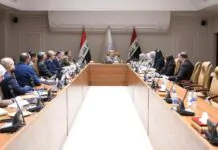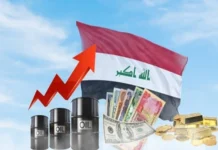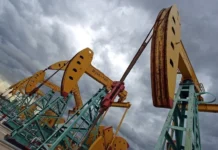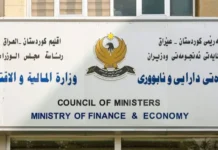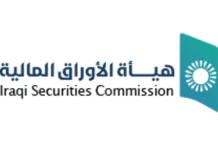Iraq Facing Economic Challenges: IMF’s Vision for 2025?
Bassam Raad The International Monetary Fund (IMF) issued a concluding statement on May 15, 2025, addressing the economic situation in Iraq, highlighting the economic challenges facing the country and presenting a roadmap for urgent reforms aimed at achieving financial stability.
Current Economic Challenges: The Iraqi economy faces complex challenges ranging from slowing global growth, Trump’s trade wars, accelerating global inflation, and declining oil prices, the primary source of revenue. Expansion in government spending (employment sector) is also widening the fiscal deficit and exacerbating the risk of reliance on oil as the primary source of revenue.
The challenges are not limited to public finances alone, but also include deteriorating infrastructure, a weak private sector, and a lack of investment in non-oil sectors. This is in addition to the fiscal deficit rising to 4.2% of GDP and a significant decline in the current account surplus.
This decline is a critical indicator that must be carefully considered, given that the current account is an important indicator of the health of the country’s overall economy.
Outlook for 2025: The Fund expects economic growth to remain weak this year, with non-oil GDP slowing to 1%. The current account is also expected to deteriorate further, impacting foreign exchange reserves, which reached $100 billion at the end of 2024, covering more than a month of imports.
The future of the Iraqi economy: The International Monetary Fund believes that the future of the Iraqi economy depends largely on the government’s ability to implement structural and financial reforms. Iraq possesses significant potential for economic growth, but realizing this potential requires taking concrete steps to implement a set of reforms proposed by the Fund.
The IMF statement emphasized the importance of cooperation between the Iraqi government and the IMF to implement these proposed reforms, which would contribute to improving the country’s economic conditions.
In conclusion, the IMF’s vision is not merely recommendations, but rather an opportunity to redirect the Iraqi economy toward sustainability through strategic planning and effective implementation of the proposed economic and financial reforms. https://economy-news.net/content.php?id=55676
Stock Exchange Economy News – Baghdad The Exchange Rate Of The US Dollar Rose Against The Iraqi Dinar, This Wednesday Morning, In Baghdad Markets.
The dollar exchange rate rose on Baghdad’s two main stock exchanges, Al-Kifah and Al-Harithiya, to 142,700 dinars per $100. On Tuesday, it reached 142,450 dinars per $100.
Selling prices at exchange offices in Baghdad’s local markets rose, reaching 143,750 dinars for $100, and 141,750 dinars for $100. https://economy-news.net/content.php?id=55670
The Permanent Council For Private Sector Development Is Examining Mechanisms To Enhance Its Role In The Iraqi Economy
Wednesday, May 21, 2025, 10:58 PM | Economic Number of reads: 149 Baghdad / NINA / The Permanent Council for Private Sector Development held its second consultative session on Wednesday evening at the Ministry of Planning. To discuss and follow up on the recommendations arising from the first meeting of the Council, including its working mechanisms and pivotal role in serving development in the country.
The Second Deputy of the Council, Abdullah Saleh Al-Jubouri, said that this is the second session, which is very important to establish work mechanisms and define the role of the Council by involving the Ministerial Council for Economy and the Council of Ministers and Representatives in correcting, amending and arranging everything related to the private sector in all its sectors, which represent (19) important sectors and include all economic activities carried out by the state.
Al-Jubouri stressed the need to develop the role of the private sector to lift a large burden off the shoulders of the rentier state, by having the private sector assume the responsibility of managing the wheel of the Iraqi economy at the present time to get out of the circle of the rentier state and seek to provide great job opportunities for various segments of society to achieve the development of the country.
For his part, the Prime Minister’s Advisor, Dr. Hamoudi Abbas Al-Lami, explained: This session came to discuss issues related to the private sector and work on formulating and crystallizing them in order to present them to the Prime Minister.
Thus, transforming them into decisions that support this sector, which represents the solution to all problems, including providing job opportunities and addressing financial problems resulting from fluctuating oil prices and other issues that all countries are experiencing as a result of military and political developments and regional conflicts.
For his part, the Director General of the Department of Economic and Financial Policies at the Ministry of Planning, Dr. Sabah Jundi Mansour, indicated that the Council represents a vital platform for strengthening partnerships between the public and private sectors. He stressed that this partnership is an urgent necessity to drive sustainable economic development in Iraq and open new horizons for investment.
He stressed the need for our recommendations and decisions to be implementable and serve the country’s development goals, thus promoting and developing the private sector.
The session, which was attended by the Secretary-General of the Council, Muhammad Al-Har, witnessed the participants presenting specialized sectoral papers that addressed the challenges and opportunities for developing the private sector in various fields, praising the role of the Ministry of Planning, its great support for the private sector, and its efforts to provide the best conditions for the Council’s work. /End
https://ninanews.com/Website/News/Details?key=1228324
Minister Of Finance: Restructuring Government Banks Represents A Pivotal Step Toward Developing The Banking Sector
Economy | 05/21/2025 Mawazine News – Baghdad Finance Minister Taif Sami affirmed on Wednesday that the restructuring of government banks represents a pivotal step towards developing the banking sector.
A statement from the ministry received by Mawazine News stated: “Minister of Finance Taif Sami chaired today a joint meeting of the administrations of Rafidain and Rashid Banks and representatives of Ernst & Young Consulting to follow up on the implementation stages of the government banks restructuring project.” The statement added that “the meeting discussed the progress made in reviewing and updating the internal regulations of the two banks in line with governance requirements, in addition to assessing the status of the banks’ foreign branches and ways to develop them and link them to the central administration.”
The statement explained that “the meeting also addressed updating data on credits, deposits, and clean assets, and implementing the comprehensive banking system in an increasing number of branches, in addition to reviewing plans to increase the capital of the two banks, studying the reality of investments, and assessing their financial feasibility.”
It continued, “The meeting also touched on following up on the legal aspects related to the restructuring process and the proposed amendments to the internal regulations to ensure their consistency with applicable banking laws and regulations.”
According to the statement, the minister stressed “the need to accelerate the pace of work and implement requirements according to the specified timetables,” noting that “the restructuring of government banks represents a pivotal step toward developing the banking sector and raising its efficiency.”
Sami called for “continued coordination between the two banks and the consulting body to ensure the completion of the requirements for institutional and administrative transformation.”
https://www.mawazin.net/Details.aspx?jimare=261775
The Central Bank Reveals The Amount Of Its Financing For Clean Energy Projects
Banks Economy News – Baghdad The Central Bank of Iraq announced on Wednesday that it has begun granting banking licenses to support climate change, preserve the environment, and finance green projects. It also announced a donation of half a billion dinars to each brick factory to transition to clean energy, and 350 billion dinars to the urban afforestation initiative.
“Central banks are playing an increasing role today in supporting environmental improvement and developing the green economy as part of a global trend toward sustainability and addressing climate challenges,” said Ali Al-Alaq, the bank’s governor, during the first international conference on carbon economics in Iraq, as monitored by Al-Eqtisad News.
“In recent years, this trend has expanded significantly to include environmental and climate issues due to their impact on the macroeconomy and financial stability.”
He added, “Our monetary policy is based on encouraging green financing, providing favorable financing terms for environmental projects, encouraging banks and financial institutions to disclose the discovery of these climate risks and ways to manage them, cooperating with other central banks through networks such as the Financial System Network to exchange knowledge and unify efforts, and integrating environmental risks into the banking sector and measuring their impact.”
Al-Alaq continued, “I would like to highlight a number of initiatives undertaken by the Central Bank of Iraq as part of a series of innovative solutions and measures that contribute to mitigating immediate environmental challenges.
These include the Central Bank’s presentation, in cooperation with the Higher Committee for Lending in the Council of Ministers, of a one-trillion-dinar initiative to shift from the use of traditional energy sources to renewable energy and reduce carbon emissions to achieve sustainable development.”
He pointed out that “the loans granted to environmentally and sustainable projects under this initiative relate to waste recycling. These projects have already been funded, including the management of the palm cultivation project, the Abu Ghar fields in the Samawah desert, and the Green House project.”
Al-Alaq explained, “We at the Central Bank have also worked in cooperation with the World Bank to develop a green financing model and adopt it as part of our approved financial sustainability roadmap for the years 2023-2029.
One of its outcomes is the development of a sustainable financing roadmap for managing environmental, social, and governance risks. By implementing these rules and practices, the banking sector will be the first to implement them to ensure that its activities do not harm the environment.”
He added, “We have also begun granting specialized banking licenses to support climate action and environmental conservation through financing green projects, and work is underway to integrate these banks into the Iraqi banking ecosystem soon.”
He announced that “the Central Bank of Iraq has implemented important projects, including the rehabilitation of brick factories to convert from polluting fuels, such as black oil, to clean fuels, such as liquid gas, to reduce carbon emissions, as these factories constitute a major source of environmental pollution, especially in the capital, Baghdad. We have allocated 500 million dinars for each factory that converts from polluting fuels to clean fuels.”
Al-Alaq affirmed, “We also provided support to the Environmental Improvement Fund to combat air pollution, with an amount of one billion dinars, to contribute to the spread of green spaces and reduce polluting emissions.
The Central Bank also financed waste recycling projects within the framework of the Energy Initiative. Work is currently underway within these frameworks and procedures to help reduce soil pollution, especially in sanitary landfill areas, which represent a future environmental risk that will impact the type and quality of soil in housing, agricultural, and other projects.”
The Central Bank Governor said, “We have also worked to finance various small agricultural projects within the framework of this bank’s initiative, under the ‘Afaq’ programme, in partnership with the International Labour Organisation, the Iraqi Guarantee Company and private banks.
This funding amounted to approximately three billion dinars, specifically for forcibly displaced communities in the governorates of Nineveh and Dohuk.”
He concluded by saying, “We would also like to point out that the Central Bank has donated and contributed approximately 350 billion dinars to the urban afforestation initiative, which contributes to developing the entrances to the governorates with green belts that act as barriers to dust and environmental pollutants and reduce desertification. We hereby declare our full readiness to provide further support in this regard.” https://economy-news.net/content.php?id=55674
For current and reliable Iraqi news please visit: https://www.bondladyscorner.com/

